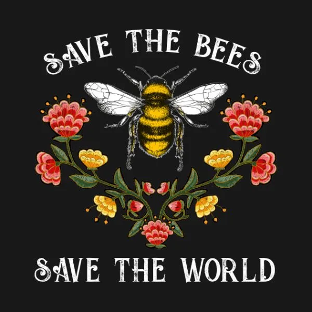On Earth Day, Every Day, Consider the Bee

May 10, 2023
Bees are very important for our earth. Bees are part of biodiversity which means we all depend on them. There are many significant pollinators like butterflies, bats, and hummingbirds, and of course, bees. When animals and insects pick up the pollen of flowers and spread it, they allow plants, including many food crops, to reproduce. Birds, rodents, monkeys, and even people pollinate, but the most common pollinators are insects, and among them, bees. The western honey bee is the most widespread managed pollinator globally, and more than 80 million hives produce an estimated 1.6 million tons of honey annually. Thanks to the bees we have many high-quality food sources such as honey, royal jelly, pollen, beeswax, and other products. Many people do not understand the significance of the role of bees and other pollinators and how essential they are to our survival. For instance, honey bees are a key part of the global food system and pollinate about 80% of our food crops. According to The Bee Conservancy “Bees lie at the heart of our survival. They pollinate 1 in 3 bites of food we eat and are essential to the health and prosperity of countless ecosystems.” And without pollinators, plants that rely on pollination to reproduce will not survive. The loss of bees contributing to the loss of plants that require pollination then impacts the animals that rely on those plants as food sources, so it is not difficult to see how the dramatic change in several ecosystems could affect our food supply and more.
Bees are at risk
Bees and other pollinators, such as butterflies, bats, and hummingbirds are increasingly endangered by human activities. Bees are at risk of extinction because of human impact on the earth’s ecosystems. Bee populations have been disappearing and dying globally over recent decades due. In fact several bee species are listed as endangered under the Endangered Species Act of 1973. Factors contributing to the decline in bee populations include: intensive farming practices, changes in weather patterns due to climate change, the excessive use of agrochemicals such as pesticides, and habitat loss.
Threats that Impact Bees
Pesticides:
- Pesticides can affect the navigation pattern as well as learning and feeding behavior.
- Pesticides, when applied to crops, can reach bees through the air, water, and soil.
- Neurotoxic pesticides negatively affect bees’ ability to recognize their nests.
Air pollution:
Bees rely on their sense of smell to identify different flowers, making them effective pollinators. But air pollution can mask scent molecules from plants, air pollutants interact with scent molecules released by plants which bees need to locate food. The mixed signals interfere with the bees’ ability to forage efficiently, making them slower and less effective at pollination.
Climate change:
- Climate change disturbs the seasonal activities of wild bees.
- Extreme rainfall can disrupt bees foraging patterns.
- Wildfires and floods may destroy bee habitats and food sources.
- Drought may also reduce available forage and discourage land managers from planting new areas for bees as water becomes less readily available.
Ways to Help Bees:
- Reduce air pollution
- Support sustainable farming practices
- Restore key habitat
- Plant nectar-bearing flowers such as marigolds, sunflowers, basil, and rosemary for decorative purposes on balconies, terraces, and gardens
- Buy honey and other hive products from your nearest local beekeeper
- Raise awareness among children and adolescents on the importance of bees and express your support for beekeepers
- Set up a pollinator farm on your balcony, terrace, or garden
- Preserve old meadows, which feature a more diverse array of flowers, and sow nectar-bearing plants
- Cut grass on meadows only after the nectar-bearing plants have finished blooming
- Use pesticides that do not harm bees, and spray them in windless weather, either early in the morning or late at night, when bees withdraw from blossoms
Put it on your calendar:
- Earth Day is April 22
- World Bee Day is May 20 — Declared by the United Nations, World Bee Day raises awareness of the essential role bees, and other pollinators play in keeping people and the planet healthy.
There are many things that can impact our planet. Climate change is increasing and recently the Willow Project has been approved which may have many impacts on our planet. If we are not careful with animals that are part of biodiversity or animals in general, we might end up damaging the earth more, ourselves, and increasing climate change. Because animals are part of our ecosystem they build the planet with plants and trees. Bees are very important for our planet without bees you are not going to be able to enjoy your favorite foods. They help us and other animals, but we humans are killing them slowly. We need to do something before it’s too late.
In my home country of Guatemala there are people that plant broccoli, corn, beens, cucumber, watermelon, coffee, and much more. Bees are essential for these crops to grow. Coffee plants bloom with myriad white, beautiful flowers and then convert into coffee beans of different colors. You can see bees collecting pollen on the many flower varieties that people love to plant. But there are people that don’t care about the bees and don’t know much about the essential role they play in the health and viability of our ecosystems and ultimately our plant. As the years go by climate change has been affecting crops. My brother-in-law has learned a lot about bees. He loves honey, and he has a lot of beehives. My mother loves any kind of flower, and she used to plant a lot of flowers in Guatemala and take good care of them. I remember going outside and looking at a lot of bees, hummingbirds, and butterflies getting pollen. It is something beautiful to look at, looking at the healthy flowers blossoms. And all of this beauty because of our pollinators. SAVE THE BEES!










